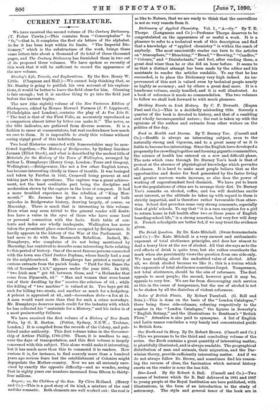Stanley's Life, Travels, and Explorations. By the Rev. Henry W.
Little. (Chapman and Hall.)—We cannot help thinking that, as Mr. Stanley is going to publish his own account of his explora- tions, it would be better to leave the field clear for him. Gleaning is fair enough ; but it is another thing to go into the field just before the harvest begins.
The new (the eighth) volume of the New Yariorem Edition of Shakespeare, edited by Horace Howard Furness (J. P. Lippincott, Philadelphia and London), contains the play of As You Like It. "The text is that of the First Folio, as accurately reproduced as a comparison almost letter by letter can make it." The notes, as the title indicates, are gathered from diverse sources. It is a fashion to sneer at commentators, but real readers know how much we owe to them. It is impossible to study this volume without seeing signiil proof of this indebtedness.
Two local Histories connected with Somersetshire may be men- tioned together,—The History of Bridgewater, by Sydney Gardnor Jarman (Elliot Stock), and what is described by the modest title of Materials for the History of the Town of Wellington, arranged by Arthur L. Humphreys (Henry Gray, London ; Tozer and Gregory, Wellington).—Bridgewater, like not a few other English towns, has become interesting chiefly in times of trouble. It was besieged and taken by Fairfax in 1645, Cromwell being present at and taking part in the operations. The capture was a great achieve- ment, not the least creditable part being the discipline and moderation ahovrn by the captors in the hour of conquest. It had a more troubled experience in the rebellion of "King Mon- mouth." Mr. Jarman has given a long account of both episodes in Bridgewater history, drawing largely, of course, on Macaulay. There is much that is interesting in this volume. Even what may seem trivial to the general reader will doubt- less have a value in the eyes of those who have some local or personal connection with the facts. Both table of con- tents and index are wholly inadequate. Wellington has never taken the prominent place sometimes occupied by Bridgewater. It hardly appears in the history of the War of the Parliament. It had more to do with the Monmouth Rebellion. Indeed, Mr. Humphreys, who complains of its not being mentioned by Macaulay, has contrived to describe some interesting facts relating to this period of history. One of the most famous persons connected with the town was Chief Justice Popham, whose family had a seat in the neighbourhood. Mr. Humphreys has printed a variety of curious extracts from the parish books. "Paid for the Beare the 5th of November 1/4/3," appears under the year 1686. In 1689, "two Irish men" get 6d. between them, and "a Hollander that come from Plymouth, 4d." "Man and woman that were burnt out of their dwelling by fier " receive the solacium of 6d. ; while the killing of "two martins" is valued at 2s. Two boys get 3d. each for killing two stoats, and another as much for a hedgehog. A polecat is appraised at 4d., and—hcrrrendum dietu—a fox at is. A man would want more than that for such a crime nowadays. Mr. Humphreys deserves much credit for the industry with which he has collected his "materials for a History," and his index is of a most praiseworthy fullness.
We have received the first volume of a History of New South Wales, by G. R. Barton. (Potter, Sydney, N.S.W. ; Triibner, London.) It is compiled from the records of the Colony, and pub- lished under authority. This first volume takes in the Governor- ship of Arthur Phillip, 1783-1789. Those, it is needless to say, were the days of transportation, and this first volume is largely concerned with this subject. This alone would make it interesting, but it has much more than this to commend it to readers. How curious it is, for instance, to find scarcely more than a hundred years ago serious fears lest the establishment of Colonies might depopulate the Mother-country. Now we are all seriously exer- cised by exactly the opposite difficulty—and no wonder, seeing that in eighty years our numbers increased from fifteen to thirty- four millions.




































 Previous page
Previous page